The fabric toys market is estimated to be valued at USD 7.1 billion in 2025 and is projected to reach USD 11.4 billion by 2035, registering a compound annual growth rate (CAGR) of 4.8% over the forecast period.
A market growth curve shape analysis reveals steady, linear growth with a slight acceleration towards the latter part of the forecast period. From 2021 to 2025, the market progresses from USD 5.6 billion to 7.1 billion, with incremental values passing through USD 5.9 billion, 6.2 billion, 6.5 billion, and 6.8 billion. This early phase of growth is largely driven by steady consumer demand, the increasing popularity of eco-friendly, handmade, and educational fabric toys, and growing awareness of their benefits in early childhood development. Between 2026 and 2030, the market continues to expand from USD 7.1 billion to 9.0 billion, with intermediate values of USD 7.5 billion, 7.8 billion, and 8.2 billion.
The growth curve begins to show signs of acceleration in this phase, driven by the rising demand for high-quality, sustainable, and customizable fabric toys, particularly in the premium segment. From 2031 to 2035, the market progresses from USD 9.4 billion to 11.4 billion, moving through USD 9.9 billion, 10.4 billion, and 10.9 billion. The later phase reflects continued growth fueled by an expanding consumer base, innovative designs, and the increasing adoption of fabric toys in developing markets.
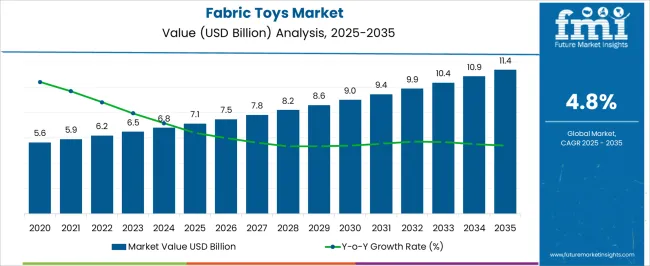
The fabric toys market is driven by five key parent markets that shape its growth, demand, and applications across diverse consumer segments. The toy manufacturing market contributes the largest share, about 28-32%, as fabric toys, such as soft dolls, plush animals, and stuffed figures, are essential components of the toy industry, catering to children’s entertainment, comfort, and developmental needs. The gift and novelty items market adds approximately 20-24%, with fabric toys often being popular gifts, particularly for special occasions such as birthdays, holidays, and celebrations, due to their soft texture and sentimental appeal.
The home décor and lifestyle products market contributes around 15-18%, with fabric toys being used in home decoration, such as fabric-based throw pillows or stuffed figures, offering both aesthetic appeal and a sense of warmth and comfort in living spaces. The baby and infant products market accounts for roughly 12-15%, as fabric toys are a popular choice for infant and toddler products due to their safety, softness, and sensory engagement features, which help in the early stages of motor skills and cognitive development. Finally, the e-commerce and online retail market represents about 8-10%, where online platforms provide consumers access to a wide variety of fabric toys from niche brands, collectible toys, and customizable designs.
| Metric | Value |
|---|---|
| Fabric Toys Market Estimated Value in (2025 E) | USD 7.1 billion |
| Fabric Toys Market Forecast Value in (2035 F) | USD 11.4 billion |
| Forecast CAGR (2025 to 2035) | 4.8% |
The fabric toys market is experiencing consistent expansion, driven by rising parental focus on safe, durable, and educational play products. Industry insights and brand announcements have highlighted a steady shift toward high-quality, eco-friendly materials as consumer awareness regarding product safety grows. Increasing disposable incomes, combined with greater spending on child development products, have encouraged demand for fabric toys across both developed and emerging markets.
Global toy safety regulations and certifications have reinforced the use of non-toxic, hypoallergenic fabrics, influencing product design and manufacturing standards. Additionally, the growth of organized retail and e-commerce has widened product accessibility, with specialty brands promoting sustainable sourcing and artisanal craftsmanship.
Seasonal demand peaks during gifting occasions and holiday seasons have further strengthened sales volumes. Looking ahead, continued innovation in fabric durability, washability, and interactive features is expected to expand the appeal of fabric toys across multiple age categories. Segmental leadership is anticipated from stuffed animals and dolls, the 3–6 years age group, and cotton-based products, reflecting strong consumer preferences for safe, engaging, and tactile play experiences.
The fabric toys market is segmented by product type, age group, material, price, end use, distribution channel, and geographic regions. By product type, fabric toys market is divided into stuffed animals and dolls, educational toys, activity and play toys, soft musical toys, and others. In terms of age group, fabric toys market is classified into 3-6 years, 0–3 years, and 6-12 years. Based on material, fabric toys market is segmented into cotton, polyester fabric, organic fabric, and blended fabrics. By price, fabric toys market is segmented into medium, low, and high. By end use, fabric toys market is segmented into personal use and commercial use. By distribution channel, fabric toys market is segmented into online and offline. Regionally, the fabric toys industry is classified into North America, Latin America, Western Europe, Eastern Europe, Balkan & Baltic Countries, Russia & Belarus, Central Asia, East Asia, South Asia & Pacific, and the Middle East & Africa.
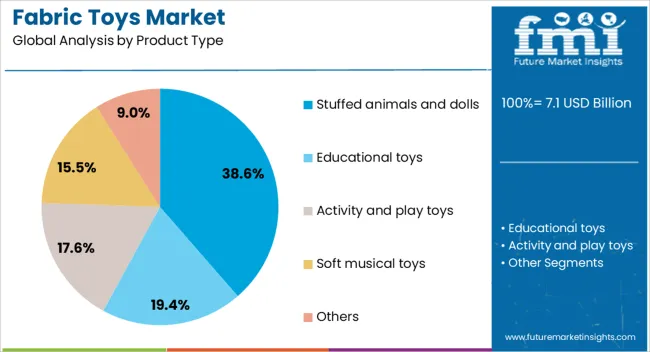
The stuffed animals and dolls segment is projected to contribute 38.6% of the fabric toys market revenue in 2025, securing its lead through enduring popularity and emotional appeal among children. This segment’s growth has been supported by its ability to foster imaginative play, emotional bonding, and comfort for young users.
Manufacturers have diversified product offerings with a variety of character designs, sizes, and themes, catering to both educational and entertainment needs. The segment has also benefited from advancements in fabric technology, enabling softer textures and enhanced durability while maintaining compliance with stringent safety standards.
Marketing strategies have successfully leveraged character licensing and storytelling to enhance product desirability. With high repeat purchase potential and strong appeal across cultural markets, stuffed animals and dolls continue to dominate consumer spending within the fabric toys category.
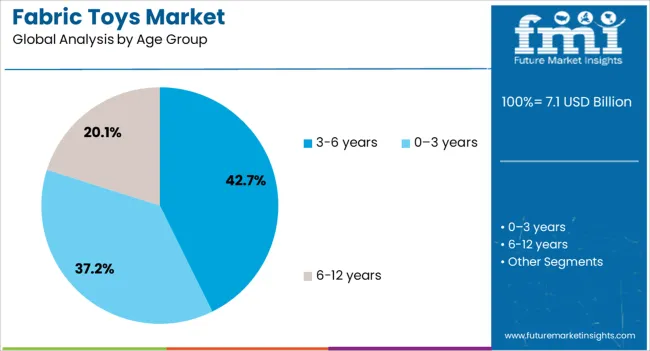
The 3-6 years segment is projected to account for 42.7% of the fabric toys market revenue in 2025, maintaining its lead due to the developmental needs of this age group. This stage is critical for fostering motor skills, social interaction, and cognitive growth, making fabric toys an attractive choice for parents and educators.
Industry reports have indicated strong demand for safe, tactile, and engaging toys that encourage role-playing and early learning. Fabric toys in this category often incorporate interactive features, bright colors, and familiar shapes, which enhance engagement while remaining safe for prolonged use.
Retail data suggests that this age group drives significant gift purchases, especially during birthdays and festive seasons. As educational play continues to be prioritized by caregivers, the 3–6 years segment is expected to retain its market prominence.
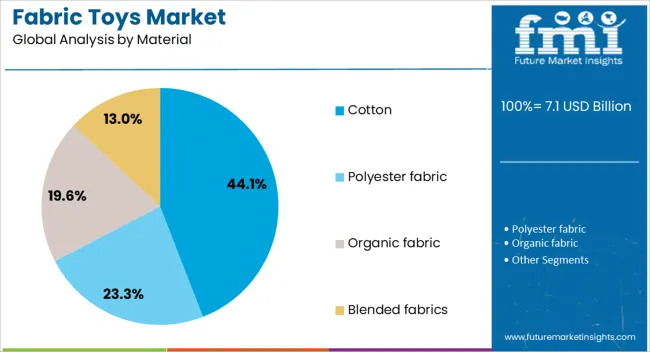
The cotton segment is projected to represent 44.1% of the fabric toys market revenue in 2025, establishing itself as the leading material choice. Growth in this segment has been driven by cotton’s natural softness, breathability, and hypoallergenic properties, making it ideal for children’s products.
Manufacturers have increasingly turned to organic and sustainably sourced cotton to meet eco-conscious consumer preferences and comply with safety regulations. Cotton’s durability and ease of cleaning have further reinforced its suitability for toys intended for frequent use.
Industry trends indicate a growing emphasis on biodegradable and chemical-free materials, positioning cotton-based toys as a trusted and premium option. With ongoing innovation in fabric treatments that enhance stain resistance and color retention, the cotton segment is expected to sustain its leadership in the fabric toys market.
The fabric toys market is expanding due to rising demand for eco-friendly, safe, and non-toxic products for children. As parents prioritize sustainability, fabric toys made from organic materials, recycled fibers, and eco-friendly dyes are gaining popularity. Challenges include higher production costs due to quality materials and labor-intensive manufacturing. Opportunities lie in the customization of toys, growth in online retail, and the increasing demand in emerging markets. Manufacturers focusing on product innovation, sustainability, and digital engagement through online platforms are best positioned to capitalize on market growth, particularly in North America, Europe, and Asia-Pacific.
The fabric toys market is witnessing significant growth, driven by increasing consumer demand for eco-friendly, safe, and sustainable products for children. Parents are increasingly prioritizing non-toxic, hypoallergenic, and ethically sourced toys, making fabric toys a popular choice. With growing concerns about plastic pollution and the safety of traditional plastic toys, fabric toys made from organic cotton, wool, and recycled materials are gaining traction. Brands such as Steiff, GUND, and Jellycat are focusing on creating high-quality, environmentally friendly fabric toys that combine durability, safety, and aesthetic appeal. The growing awareness about sustainable parenting and the demand for safe toys further drive market expansion.
The fabric toys market faces challenges related to rising production costs, material sourcing, and labor-intensive manufacturing processes. Fabric toys require high-quality materials such as organic cotton, wool, and eco-friendly dyes, which tend to be more expensive than conventional synthetic materials. Additionally, sourcing these materials sustainably can increase operational costs. Labor-intensive manufacturing processes, including hand-stitching and attention to detail, contribute to higher production costs. Moreover, ensuring compliance with stringent safety standards and certifications for children's toys further complicates production. Manufacturers must balance quality, affordability, and ethical sourcing practices to remain competitive in this growing market.
Opportunities in the fabric toys market are driven by the increasing popularity of customization, online retail, and expanding consumer markets in developing regions. Personalized fabric toys, such as those with the child's name or unique designs, are gaining popularity among consumers seeking more individualized gifting options. The rise of e-commerce platforms allows manufacturers to reach a global audience, particularly in regions like North America, Europe, and Asia-Pacific, where demand for high-quality, unique toys is growing. Additionally, as disposable income increases in emerging markets, the demand for premium fabric toys is expected to rise, providing further growth potential.
Key trends in the fabric toys market include product innovation, sustainability, and digital engagement. Manufacturers are focusing on creating fabric toys with innovative features, such as interactive elements, multi-sensory experiences, and educational content. Sustainable practices, including the use of biodegradable materials and eco-friendly packaging, are becoming more prevalent as consumers prioritize environmentally responsible products. Digital engagement is growing, with many companies leveraging social media, influencer marketing, and online platforms to promote their fabric toys. The integration of augmented reality (AR) or virtual experiences to enhance playtime is an emerging trend, further driving product differentiation and consumer interest.
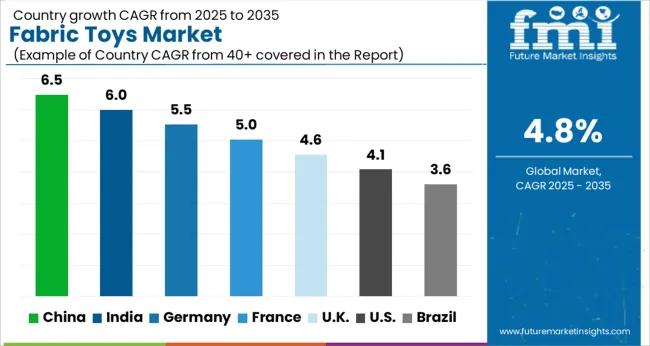
| Country | CAGR |
|---|---|
| China | 6.5% |
| India | 6.0% |
| Germany | 5.5% |
| France | 5.0% |
| UK | 4.6% |
| USA | 4.1% |
| Brazil | 3.6% |
Global fabric toys demand is projected to grow at a 4.8% CAGR from 2025 to 2035. China leads with 6.5%, followed by India at 6.0% and France at 5.0%, while the UK shows 4.6% and the USA records 4.1%. These rates translate to a growth premium of +35% for China, +30% for India, and +4% for France versus the baseline, whereas the UK and USA trail by -4% and -14%, respectively. Divergence is driven by local factors: increasing disposable income and growing interest in eco-friendly, non-toxic toys in China and India, strong retail networks in France and the UK, and high consumer awareness in the USA, which are shaping regional markets.. The analysis includes over 40+ countries, with the leading markets detailed below.
The fabric toys market inn Chinais expected to grow at a CAGR of 6.5% from 2025 to 2035. The country’s growing middle class and increasing disposable income are fueling the demand for high-quality fabric toys, particularly among parents seeking safe, durable, and eco-friendly options for their children. As consumer preferences shift towards soft, non-toxic, and hypoallergenic materials, fabric toys have gained popularity. China’s vast e-commerce infrastructure facilitates easy access to a variety of fabric toys, from plush animals to character-themed soft toys. Additionally, the rise of both domestic and international toy brands in China continues to support market growth. With the growing focus on children's safety and well-being, the demand for fabric toys is expected to increase. The trend toward personalized and customizable fabric toys is also helping to drive sales, catering to the unique preferences of consumers.
The fabric toys market in India is projected to grow at a CAGR of 6.0% from 2025 to 2035. The rise in disposable income and urbanization is creating new opportunities for toy manufacturers in India. As more parents seek alternatives to traditional plastic toys, fabric-based toys are becoming increasingly popular due to their safety features and non-toxic materials. The popularity of plush toys, soft animals, and character-based toys is growing rapidly, particularly with the rise of global toy franchises. The rapid expansion of online retail platforms in India is making fabric toys more accessible, as e-commerce offers a wide range of products for various age groups. With increasing awareness regarding child safety and the increasing presence of international and local toy brands, India presents a promising market for fabric toys.
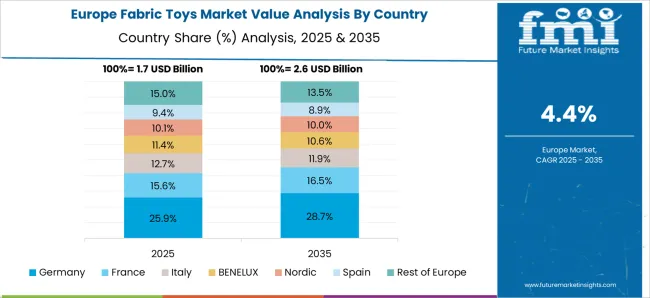
The fabric toys market in France is expected to expand at a CAGR of 5.0% from 2025 to 2035. French consumers have increasingly prioritized the safety, durability, and sustainability of children’s toys, with fabric toys meeting these criteria. The rising demand for plush toys, soft dolls, and educational fabric toys is expected to fuel market growth. The growing trend of eco-conscious parenting has led to a shift toward organic and natural fabric toys, which are perceived as safer and more environmentally friendly than their plastic counterparts. Additionally, France’s strong retail network, both physical and online, makes it easier for consumers to access a variety of fabric toys from local and international brands. French parents, particularly in urban areas, are becoming more selective in choosing toys, giving preference to high-quality fabric-based options.
The UK fabric toys market is projected to grow at a CAGR of 4.6% from 2025 to 2035. The UK has a well-established demand for fabric-based toys, particularly plush toys and soft dolls, as parents look for safe and durable alternatives to plastic toys. As environmental awareness increases, there is a growing preference for fabric toys made from organic, eco-friendly materials. The demand for high-quality and personalized fabric toys, such as custom-made plush animals or dolls, is also on the rise. The UK market benefits from a strong retail infrastructure, both online and offline, with many well-established brands offering a wide range of fabric toys. The market is also supported by the growing trend of social media influencing consumer purchasing decisions.
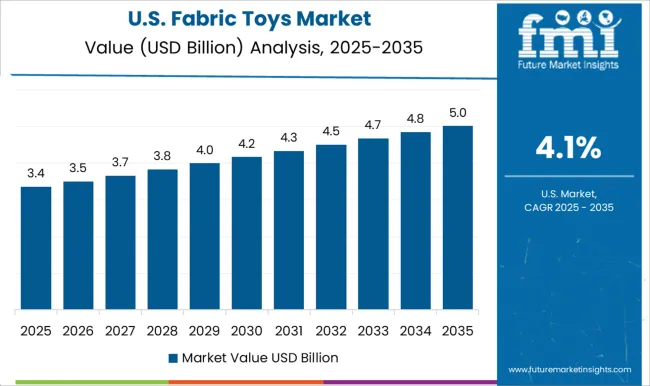
The USA fabric toys market is expected to grow at a CAGR of 4.1% from 2025 to 2035. The USA is a mature market for fabric toys, with a well-established demand for plush toys, soft dolls, and educational fabric toys. Increasing consumer preference for safe, non-toxic, and eco-friendly toys is expected to drive the growth of fabric toys in the USA The rise of organic and sustainably produced fabric toys is also a growing trend, as USA parents are becoming more conscious of the materials used in their children’s products. The expansion of online retail platforms and direct-to-consumer brands has made fabric toys more accessible to a wider audience. As toy manufacturers continue to innovate and create customizable fabric toys, there is an increasing demand for unique, one-of-a-kind products.
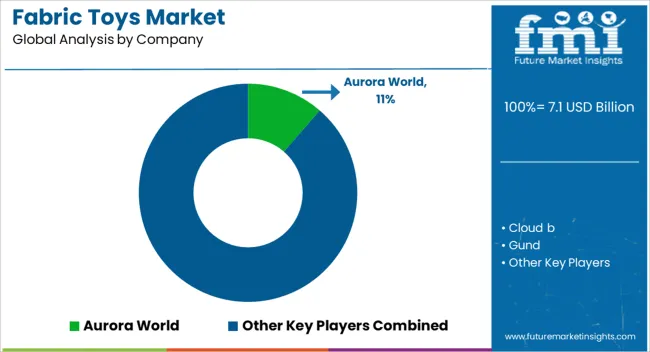
The fabric toys market is witnessing steady growth with a global CAGR of 4.8%. Leading players such as Aurora World, Cloud b, Gund, Hasbro, IKEA (Soft Toy Line), Jellycat, LEGO, Mary Meyer Corporation, Mattel, Melissa & Doug, Spin Master, Steiff, The Manhattan Toy Company, Ty, and Wild Republic are shaping the competitive landscape. Aurora World is known for its plush, high-quality fabric toys, with its product brochures emphasizing comfort, durability, and wide appeal across different age groups. Cloud b focuses on calming, therapeutic toys designed for infants, with their brochures highlighting features like sound and light functionalities for promoting better sleep. Gund, part of the Hasbro brand, has long been recognized for its soft, huggable toys.
Their marketing highlights innovations in interactive plush toys, with a focus on personalization and emotional connections. Hasbro’s soft toy line is marketed to both collectors and young children, with brochures showcasing iconic characters and the latest innovations in design. IKEA’s soft toy line, in partnership with various charity initiatives, focuses on affordability and ethical production, appealing to eco-conscious consumers. Jellycat emphasizes unique, whimsical designs and high-end fabric materials, positioning its toys as premium options, with brochures focusing on the playful nature and superior craftsmanship of its creations. LEGO and Mattel enter the fabric toys space with innovative collaborations. LEGO’s fabric toys feature beloved character designs while maintaining the brand’s commitment to creativity and development.
Mattel focuses on fabric toys based on its famous character lines like Barbie, highlighting interactive and imaginative play. Mary Meyer Corporation, Melissa & Doug, and Spin Master also focus on plush toys with educational value, using brochures to showcase development of skills through play, from early motor skills to imaginative role play. Steiff and Ty lead in the premium segment, with Steiff marketing its high-quality, collectible fabric toys, often with limited edition releases, while Ty’s Beanie Babies continue to capture the nostalgic collector's market. The Manhattan Toy Company and Wild Republic emphasize imaginative designs and eco-friendly materials in their offerings, with a focus on fun, educational themes.
| Item | Value |
|---|---|
| Quantitative Units | USD 7.1 billion |
| Product Type | Stuffed animals and dolls, Educational toys, Activity and play toys, Soft musical toys, and Others |
| Age Group | 3-6 years, 0–3 years, and 6-12 years |
| Material | Cotton, Polyester fabric, Organic fabric, and Blended fabrics |
| Price | Medium, Low, and High |
| End Use | Personal use and Commercial use |
| Distribution Channel | Online and Offline |
| Regions Covered | North America, Europe, Asia-Pacific, Latin America, Middle East & Africa |
| Country Covered | United States, Canada, Germany, France, United Kingdom, China, Japan, India, Brazil, South Africa |
| Key Companies Profiled | Aurora World, Cloud b, Gund, Hasbro, IKEA (Soft Toy Line), Jellycat, LEGO, Mary Meyer Corporation, Mattel, Melissa & Doug, Spin Master, Steiff, The Manhattan Toy Company, Ty, and Wild Republic |
| Additional Attributes | Dollar sales by product type (plush toys, educational fabric toys, interactive soft toys), age group (infants, toddlers, children, collectors), and material type (cotton, polyester, organic fabric). Demand dynamics are influenced by consumer preference for safety, educational value, and eco-conscious choices. Regional trends highlight strong growth in North America, Europe, and Asia-Pacific, supported by increasing disposable income, shifting consumer preferences towards sustainable products, and the growing popularity of plush toys for both play and decoration. |
The global fabric toys market is estimated to be valued at USD 7.1 billion in 2025.
The market size for the fabric toys market is projected to reach USD 11.4 billion by 2035.
The fabric toys market is expected to grow at a 4.8% CAGR between 2025 and 2035.
The key product types in fabric toys market are stuffed animals and dolls, educational toys, activity and play toys, soft musical toys and others.
In terms of age group, 3-6 years segment to command 42.7% share in the fabric toys market in 2025.






Full Research Suite comprises of:
Market outlook & trends analysis
Interviews & case studies
Strategic recommendations
Vendor profiles & capabilities analysis
5-year forecasts
8 regions and 60+ country-level data splits
Market segment data splits
12 months of continuous data updates
DELIVERED AS:
PDF EXCEL ONLINE
Fabric Spreading Machine Market Forecast Outlook 2025 to 2035
Fabric Freshener Market Forecast and Outlook 2025 to 2035
Fabric Inspection Machine Market Size and Share Forecast Outlook 2025 to 2035
Fabric Cutting Machine Market Size and Share Forecast Outlook 2025 to 2035
Fabric Testing Equipment Market Size and Share Forecast Outlook 2025 to 2035
Fabric Softener Sheet Market Size and Share Forecast Outlook 2025 to 2035
Fabric Filter System Market Size & Forecast 2025 to 2035
Fabric Softener Market Analysis by Nature, Product Type, End Use, Sales Channel & Region from 2025 to 2035
Fabric Care Market Analysis - Trends, Growth & Forecast 2025 to 2035
Fabric Odor Eliminator Market – Trends, Growth & Forecast 2025 to 2035
Fabric Stain Remover Market Growth – Trends, Demand & Innovations 2025-2035
Global Fabric Cutting Machine Market Share Analysis – Trends & Forecast 2025–2035
Fabric Starch Market
Prefabricated Composite Sandwich Panels Market Size and Share Forecast Outlook 2025 to 2035
Prefabricated Bathroom Pods Market Size and Share Forecast Outlook 2025 to 2035
Prefabricated Building System Market Growth - Trends & Forecast 2025 to 2035
Mesh Fabric Market Size and Share Forecast Outlook 2025 to 2035
Data Fabric Market Analysis - Trends, Size & Forecast 2025 to 2035
Metal Fabrication Fluid Market Size and Share Forecast Outlook 2025 to 2035
Smart Fabric Market Size and Share Forecast Outlook 2025 to 2035

Thank you!
You will receive an email from our Business Development Manager. Please be sure to check your SPAM/JUNK folder too.
Chat With
MaRIA